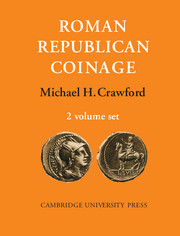Book contents
- Frontmatter
- Contents
- VOLUME I
- INTRODUCTION
- CATALOGUE
- VOLUME II
- misc-frontmatter
- 1 Technique and Technology
- 2 Weight Standards
- 3 Monetary Magistrates
- 4 Special Formulae
- 5 Administration and Control
- 6 Roman Units of Reckoning Under the Republic
- 7 Coinage and Finance
- 8 Careers of the Moneyers
- 9 Types and Legends
- 10 Art and Coinage
- Plates
- Indices
- Plate section
3 - Monetary Magistrates
from VOLUME II
Published online by Cambridge University Press: 07 October 2011
- Frontmatter
- Contents
- VOLUME I
- INTRODUCTION
- CATALOGUE
- VOLUME II
- misc-frontmatter
- 1 Technique and Technology
- 2 Weight Standards
- 3 Monetary Magistrates
- 4 Special Formulae
- 5 Administration and Control
- 6 Roman Units of Reckoning Under the Republic
- 7 Coinage and Finance
- 8 Careers of the Moneyers
- 9 Types and Legends
- 10 Art and Coinage
- Plates
- Indices
- Plate section
Summary
MONEYERS
The creation of the office is mentioned in only one literary source (D i, 2, 2, 27-32 - Pomponius), which must be quoted in full.
Cum que consules avocarentur bellis finitimis neque esset qui in civitate ius reddere posset, factum est, ut praetor quoque crearetur, qui urbanus appellatus est, quod in urbe ius redderet. (28) Post aliquot deinde annos non sufficiente eo praetore, quod multa turba etiam peregrinorum in civitatem veniret, creatus est et alius praetor, qui peregrinus appellatus est ab eo, quod plerumque inter peregrinos ius dicebat. (29) Deinde cum esset necessarius magistratus qui hastae praeessent, decemviri in litibus iudicandis sunt constituti. (30) Constituti sunt eodem tempore et quattuorviri qui curam viarum agerent, et triumviri monetales aeris argenti auri flatores, et triumviri capitales qui carceris custodiam haberent, ut cum animadverti oporteret interventu eorum fieret. (31) Et quia magistratibus vespertinis temporibus in publicum esse inconveniens erat, quinqueviri constituti sunt cis Tiberim et ultis Tiberim, qui possint pro magistratibus fungi. (32) Capta deinde Sardinia, mox Sicilia, item Hispania, deinde Narbonensi provincia totidem praetores, quot provinciae in dicionem venerant, creati sunt …
And when the Consuls were taken away from Rome by wars with neighbouring peoples and there was no one available in the city to administer justice, it was arranged that there should also be a Praetor (who came to be called Praetor Urbanus), whose job it was to administer justice in the city. After some years he was unable to cope, as a result of the influx of foreigners, and another Praetor was created (who came to be called Praetor Peregrinus, since he administered justice for the most part among foreigners). Then when there was a need for magistrates to conduct auctions, Decemviri Litibus Iudicandis were instituted. At the same time Quattuorviri to look after the roads, Triumviri to strike coinage and Triumviri Capitales to look after the prison were also instituted, the last also charged with executions. And since it was inconvenient for magistrates to appear in public at night, Quinqueviri were appointed to act for them. Then with the capture of Sardinia, Sicily, Spain, Narbonensis, as many Praetors were created as there were provinces …
The college of moneyers here forms part of a group of minor executive officers. Its existence (and little more) is confirmed by two passages of Cicero, minores magistratus partiti iuris plures in plura sunto …
- Type
- Chapter
- Information
- Roman Republican Coinage , pp. 598 - 604Publisher: Cambridge University PressPrint publication year: 1975

